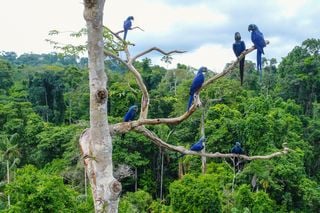Did you know that 6-Year-old girls already find reasons to give up on science?
According to a study in the journal Science, at six years old girls begin to perceive themselves as less talented in science than boys. On International Day of Women and Girls in Science, we addressed this “endemic” problem.

The study was carried out in 2017 by the journal Science, in collaboration with the universities of Princeton, New York and Illinois, with 400 boys and girls aged 5, 6 and 7 years. In it it was found that, while at the age of 5 boys and girls perceive their gender in a positive way for all kinds of challenges and disciplines, from the age of 6 this changed.
6-year-old girls only associated being a brilliant person with the female gender in 48% of the occasions, while boys did so in 65%. In another of the tests they were presented with two board games, one of them was for "very very smart" people and the other for people who try very hard. The girls were much less interested in the game for "very very smart" people.

The study allowed researchers to conclude that from the age of 6, girls begin to believe that they are less capable of performing tasks or taking on challenges related to genius and intelligence, something that the researchers themselves classified as "disheartening."
The eyes on gender stereotypes
The data highlight how gender stereotypes, cultural models and, in general, the environment, influence children very early, even before they can develop their critical capacity. And although at that age girls do not have to decide which professional career they want to develop, that idea they have about their own abilities continues to accompany them and is later reflected in their decisions about which career to choose.
Attempts to close this gap, which are mainly translated into equality policies, do not seem to be yielding the expected results, since these differences are only accentuated.
If we look, for example, at the data of universities globally, only 16% of women choose careers related to science and technology. In this way, the problem is transferred to the world of work, where the vast majority of professionals in these disciplines are still men. As a result, we continue to lay out of enough references to inspire girls to dedicate themselves to science.
Sin mujeres, la ciencia no solo pierde su talento, sino también su perspectiva para mejorar la sociedad.
— Ministerio de Educación, FP y Deportes (@educaciongob) June 6, 2023
️Las STEAM necesitan las mentes y el talento de las mujeres. Es necesario fomentar las vocaciones científicas y hacer que la ciencia sea más inclusiva.#AlianzaSTEAM pic.twitter.com/v6QbqJlfjb
Create real references for girls and young people, the purpose of Meteored
From Meteored, we believe that studies such as the one in the journal Science should be taken into account when addressing possible solutions. Currently, efforts to make women visible in science are focused on pre-teens and adolescents, a short time before choosing their field of study, when it is already late.
Therefore, one of our purposes as a company is to generate real references, showing the girls in our environment, in collaboration with the schools, that there are brilliant women who studied in their same schools and institutes, who work in Meteored as meteorologists, researchers or computer scientists.
Public, private institutions, media, educators and society in general, we play a joint role and we can, if we row in the same direction, turn the data around. The challenges we face as a society need all the talent available.
...
Reference study
Gender stereotypes about intellectual ability emerge early and influence children's interests. Lin Bian, Sarah-Jane Leslie and Andrei Cimpian. 27 Jan 2017. DOI:10.1126/science.aah6524








